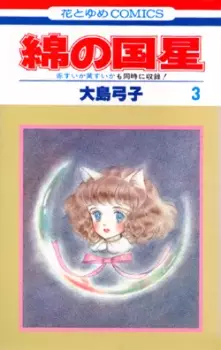Wata no Kuni Hoshi

Alternative Titles
Synonyms
Japanese
English
Information
Type
MangaPublished
Authors
Ooshima, YumikoStatus
Source
Rating
Demographics
ShoujoStatistics
Rank
Score
Scored by
Popularity
Members
Favorites
External Links
Synopsis
Chibi-Neko is a young kitten who has been abandoned. She doesn't know she has been abandoned, and doesn't know the difference between cats and humans. Indeed, she imagines herself as a human girl and believes she will become human someday. She is found and rescued by a boy named Tokio, who has just graduated from high school. However, he flunked the entrance exams and now is not sure of his future or what he will do. Chibi-Neko soon begins to love Tokio and wants to become a human and marry him someday. But then she sees Tokio with another girl in the park, and sees that he is in love with this girl. She also keeps getting visited by Raphael, a mysterious male cat who tries to tell her that cats cannot become human, they are always cats. What will Chibi-Neko do? (Source: MU)
Background
Wata no Kuni Hoshi was serialized by Hakusensha in the magazine LaLa at irregular intervals from 1978 to 1987. The series was collected in seven tankoubon volumes under the Hana to Yume imprint, and then reissued in 16 child-sized volumes. It was later reprinted in four bunkoban volumes in 1994. In 1978 received the Kodansha Manga Award in shoujo manga,category, and in 1979 it was voted the most popular series running in LaLa. According to German manga scholar Jaqueline Berndt, the depiction of cats as young girls spread to other manga series from Wata no Kuni Hoshi. It is described by Masanao Amano as not just a simple animal fable but a story in which psychological and mental states are highly differentiated. Wata no Kuni Hoshi was adapted as an anime movie that was produced by Mushi Production. The movie was directed by Shinichi Tsuji from a script by Masaki Tsuji and Yumiko Ooshima, with music by pianist Richard Clayderman. The movie was released in theaters on 11 February 1984. The movie has been praised as a "hidden gem" for its complex characterization, philosophical story, and gorgeous animation. The soundtrack of Richard Clayderman's piano music is praised by Helen McCarthy and Jonathan Clements as striking exactly the right tone for the romantic mood. The depiction of Chibi-neko's self-image as a catgirl was seen by a reviewer at T.H.E.M. Anime as a metaphor for adolescence. (Source: Wikipedia)